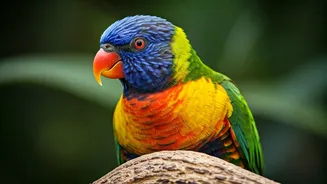Super Smart Birds
Parrots are often underestimated, but their intelligence is truly remarkable. Research has shown that they possess cognitive abilities comparable to those
of young children. They can recognize objects, solve problems, and even understand cause and effect. Some parrots can learn hundreds, even thousands of words, and use them in context, indicating a sophisticated level of communication. Their ability to mimic sounds isn't just for show; it's a way for them to learn and communicate, further showcasing their intelligence. This remarkable intelligence allows them to adapt to different environments and thrive in various situations.
Lifespan Surprises
One of the most surprising aspects of parrots is their longevity. Many parrot species live for decades, far surpassing the lifespan of many other pets. Smaller parrots may live for 20-30 years, but larger species, like macaws and cockatoos, can live for 50-80 years or even longer. This long lifespan means that owning a parrot is a significant commitment. Potential owners need to consider the long-term care, financial implications, and emotional bonds that come with sharing a life with these long-lived birds.
Social Creatures
Parrots are highly social animals, and their well-being depends on interaction. In the wild, they live in flocks, relying on each other for protection, foraging, and social bonding. This social nature translates to their life in captivity. Parrots require regular interaction with their owners, other birds, or even toys that stimulate interaction. Without adequate social stimulation, parrots can suffer from loneliness, stress, and behavioral problems. Providing a stimulating environment that allows them to interact and communicate is crucial for their mental health and happiness.
Dietary Needs
Parrots have specific dietary requirements that are crucial for their health. Unlike many other pet birds, parrots need a varied diet that includes fresh fruits, vegetables, seeds, and nuts. A diet solely based on seeds is often inadequate and can lead to malnutrition and health problems. It's essential to provide a balanced diet, including a mix of different food types to ensure they receive all the necessary nutrients. Regular access to fresh, clean water is also vital for their hydration and overall well-being. A proper diet is key to ensuring their vitality and longevity.
Feather Maintenance
Parrots are meticulous about their feather care, and maintaining healthy feathers is critical for their survival. They preen their feathers regularly to keep them clean, waterproof, and in good condition. Regular bathing or misting is essential to help them keep their feathers clean and healthy. These birds often require special housing and perches to protect their feathers from damage. Furthermore, providing a comfortable environment is also important. Owners should also observe for any signs of feather-plucking, which can indicate stress, boredom, or underlying health issues.
Communication Methods
Parrots use a variety of communication methods. Vocalizations, including mimicking human speech, are one of their most well-known ways of communicating. They also use body language, such as posture and movements, to express their emotions and intentions. The position of their feathers, the stance of their feet, and the movement of their eyes all provide clues to their mood and feelings. Understanding these communication methods helps owners build a strong bond with their parrot and respond appropriately to their needs. This multi-faceted approach to communication is a testament to their complex nature.
Common Health Issues
Parrots can be prone to certain health problems. Nutritional deficiencies, respiratory infections, and feather-related issues are all common concerns. Regular veterinary checkups are essential for early detection and treatment of these issues. Environmental factors, like exposure to toxins or poor air quality, can also affect their health. Furthermore, owners should be vigilant about any changes in behavior or physical condition that might indicate a health problem. Prompt medical attention is vital to ensuring the parrot's well-being and longevity.
Conservation Challenges
Many parrot species face significant threats in the wild. Habitat loss, deforestation, and illegal wildlife trade are the main drivers of these challenges. Over the years, many parrot species have seen their populations decrease rapidly due to human activities. Efforts to protect their habitats, combat illegal trade, and support conservation initiatives are critical to their survival. Raising awareness about the importance of parrots and promoting responsible pet ownership can also contribute to their conservation. Protecting these beautiful and intelligent birds requires a collaborative effort from individuals, organizations, and governments alike.















